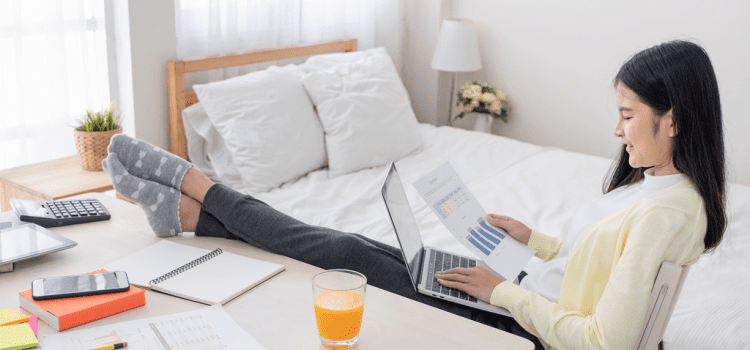Working in pyjamas. Peace and quiet. Long lunches. No stress. Plenty of time for long, bracing walks and gym sessions. Working in front of this week’s Game of Thrones…
Sadly for a lot of us, this seems to be what our friends think we’re doing when we work from home. Most home-based workers could tell them that this is pretty far from reality, and now they have the research to back them up. PR training providers, PR Unlocked, surveyed 406 freelancers and business owners who work from home to find out what it’s really like.
The practicalities of the working week
Only two-fifths of respondents said they work from home five days a week, with another fifth saying it varies week-to-week. 15% work four days a week at home and 16%, three days. A few work longer hours: 4% work at home six days a week, and 1% work seven.
Only 66% said they had a dedicated workspace at home, although some of the 34% who don’t do have a garden office, which surely counts? The rest said they work from the dining room, sofa, kitchen table or, yes, their bed. Where do these pyjama myths originate?
So where are freelancers and SME owners working when they’re not working from home? A quarter said they sometimes work from co-working spaces, and over half work from coffee shops, libraries or other public spaces. Over a third sometimes work from clients’ offices and 13% said they work from other freelancers’ or business owners’ homes.
It hints at a working environment that demands a certain amount of fluidity. It can also mean that it’s difficult to get your head into work mode when your not in your usual work space.
Eating and exercising
The long lunch culture? Hmm. 35% said they eat lunch at their desk and 3% don’t take a lunch break at all. That’s not great. We all need a physical and mental break from our work and a chance to refuel and properly digest our food.
41% take at least a 30-minute break away from their place of work (well done) and 21% take at least an hour lunch break; there may be a few long-lunchers after all, although what commitments they fit into that hour isn’t revealed. Admin? Running the washing machine? If you work from home, we all know how easy it is to fall into the habit of ‘I’ll just do this bit of housework’.
25% make time to exercise daily or most days when working from home, 37% some days, and 16% at least once a week. However, 22% never find the time to exercise; a worrying finding when a lack of exercise is recognised as an increasingly important risk factor in serious conditions including heart disease, type 2 diabetes and some cancers.
Mental well-being
Over a third of those who work from home said they regularly have days when they don’t speak to or meet other people during working hours. 40% sometimes have days where they don’t see or speak to anyone else all day. Working in a bubble like this can make things seem disproportionately stressful, let alone remove the opportunity to take five minutes out from time to time.
Only 22% of respondents said they try to meet or speak to others most days. Working from home makes people feel unproductive (53%), isolated (49%), lonely (47%) and stressed (36%). Only 15% respondents said they hadn’t experienced any negative feelings.
Some respondents specifically said they felt out of the loop with what’s going on in their industry, missed having colleagues to bounce ideas off, and wanted people to share problems with—another reason to try to make connections with other freelancers or within your industry.
The majority (80%) of freelancers and small business owners find it difficult to switch off from work, with only a fifth of saying they didn’t.
If you find it difficult, try to pack work away or shut the door on your working space if you have one. Try to have sacrosanct hours where you don’t work, and take those lunch breaks away from your desk. You need them!
Loneliness and isolation are major downsides of working from home, and a potential risk to your mental health, so if you go for days without seeing anyone else, try to make a regular effort to get out of the house and meet other people, whether that’s lunch with friends, joining a club or networking locally or within your industry.
If you work from home, how do these results compare with your working week? Let us know.







